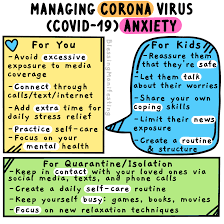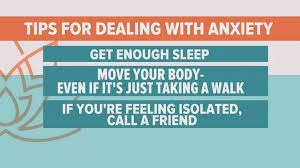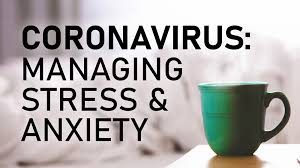Maintaining mental wellness during the COVID-19 health crisis
Surreal. This was the word that finally came to me a week or so ago, as the media and the government reported on climbing numbers of COVID-19 cases across the globe and in our country, leading to a declaration that this constituted a pandemic. Suddenly, there were announcements about school closures, restricted travel and social distancing guidelines. Shock, anxiety, fear, uncertainty, denial, helplessness… so many different reactions within us and in others around us in response to the developing situation.
In mental health, social isolation is most often associated with symptoms of depression. We would want to steer those who are socially isolated toward social engagement and connections in their life. Seeing loved ones, getting out of the house, attending community events. What would normally be considered healthy behaviour now has to be discouraged in order to protect us. We are now suddenly living in a reality where we need to learn social distancing and self-isolation. These choices may not be optimal for our mental health, they are necessary and life-saving.
Of all mental illness, anxiety is the most common affliction in people across the world. It stands to reason that anxiety has spiked in so many of us in recent weeks, even in those who may not typically consider themselves the “anxious type”. Many of us are anxious about our health and the health of those we love, about our jobs, about our finances, about trying to find control in a seemingly out-of-control world. One characteristic of anxiety disorders is that the fear or anxiety is excessive, seeming disproportionate to how real the threat may actually be. When there is a pandemic, high anxiety is expected, given the real threat of the harm of the virus. In many ways, anxiety can help to keep us safe. Our anxiety about contagion prompts us to wash our hands far more regularly, to monitor our own health for symptoms of illness and to avoid situations that might expose us to danger. It can however get out of hand, leading us to panic and to fall into thinking traps where we catastrophize and become convinced that things are as bad as we fear they are. It is important to catch ourselves when our anxiety is overwhelming and to take steps to bring our anxiety down to a level where we can think more clearly and manage our emotions. Taking a few seconds to focus on breathing in and out slowly and deeply, on stretching out our muscles or on remembering a relaxing and stress-free moment from your life can help to bring that anxiety down. Once you feel like your anxiety is less overwhelming and your body has relaxed somewhat, you are in a better place to talk your way through those anxious thoughts. A strategy for this is found below (see 4th bullet point).
I like to distinguish between maladaptive coping and adaptive coping. Both are ways in which we manage our stress and anxiety. The difference is that maladaptive coping tends to lead us to avoid the issue or make it worst (example: getting drunk to numb your emotional pain and pretending nothing is wrong) while adaptive coping empowers us to face the issue or to put it in perspective (example: talking to a friend about what is on your mind and developing a plan to help you reach a goal).
I offer the following tips and strategies as adaptive ways to cope with the stress and anxiety of the worldwide pandemic affecting us all. I have seen many great articles and resources shared in recent days, and will provide links to several of them below. I encourage you to consider which tips and strategies sound like ones that you might want to try (or pass along), and to think of others that fit you and your life.
- Set or maintain a regular routine for every day. This helps us keep a sense of normalcy and purpose in spite of changes to the global situation. This can include hygiene, eating regular healthy meals and going to sleep when you normally would.
- Limit how much you are seeking out new information about COVID-19. This is to stay informed but to not be consumed with it throughout your entire day.
- Focus on information from media you can trust (from your national news, from the Health Unit) and on the guidelines they are providing on how to stay healthy and safe. Consider how you can follow the current guidelines in your life. Be wary of sources of information on social media, as it sometimes contains misinformation.
- If your anxiety or stress about COVID-19 starts to feel overwhelming, try to respond to your anxious thoughts with a rational and helpful thought in response. For example, if you are thinking about how there are more cases of the virus being reported and how you might get it, answer that thought by reminding yourself that while the risk is real, you are doing everything you can to stay safe and healthy and that if it happens, you will seek care focus on recovery from the virus. If this feels difficult to do, think of what a rational and supportive friend would say to help you and hold onto that thought.
- Create a to-do list for yourself and/or your family with practical and fun things to do. Consult your significant other and family members for ideas of what to add to the list. This could include things like gathering items no longer needed for a future donation to a charity, starting a DIY project or deciding what favourite movies you would like to re-watch.
- Consider adding to your list those things you never feel you have the time to do: to read the book on your nightstand, to try learning how to meditate.
- Get active daily. If you don’t have a home gym, you can still get active in other ways. There are yoga, guided meditation and fitness videos available for free online on YouTube. If possible, go for a walk outside, garden outside or bike a trail nearby.
- Stay connected with people, from a safe distance. If you are self-isolating with your family, you have the opportunity to spend quality time with them. For those who are self-isolating alone, stay in touch with others by phone, text, email and/or video chat. There are free games available for download on smartphones and other devices that allow you to play games with your contacts online.
- Take advantage of certain online resources that provide you with positive ways to pass the time. For example, many museums across the globe have made virtual tours available. National movie theaters are offering home streaming of new and favourite movies at a reduced cost. Some musicians and symphonies are live streaming personal concerts online for fans to watch for free.
- Consider whether you can offer acts of kindness to others during these challenging times. Reach out to the people in your life that you know are self-isolating alone to see how they are doing or make a donation to a cause or not-for-profit agency online.
- If you are feeling unable to cope with overwhelming feelings, share your concerns with loved ones and consider seeking out mental health support. Mental health resources are available online and many therapists are making themselves available remotely by phone or videoconferencing until they are able to return to in-person office services.
I encourage you to explore some of the resources below and hope that you find them helpful.
Maintaining good mental health during a pandemic:
https://greatergood.berkeley.edu/article/item/greater_good_guide_to_well_being_during_coronavirus
https://www.camh.ca/en/health-info/mental-health-and-covid-19
Living with anxiety and worry amidst global uncertainty:
How to talk to your children about COVID-19:
https://www.ahaparenting.com/BlogRetrieve.aspx?
PostID=641509&A=SearchResult&SearchID=11445523&ObjectID=641509&ObjectType=55
https://www.health.harvard.edu/blog/how-to-talk-to-children-about-the-coronavirus-2020030719111
How to manage anxiety when watching news coverage about COVID-19:
https://www.apa.org/helpcenter/pandemics
Strategies for reducing COVID-19 transmission:
Virtual museum tours and virtual concert information:
Acts of kindness from Canadians during the Coronavirus pandemic:
https://www.bbc.com/news/world-us-canada-51915723
Wishing you good mental and physical health throughout these trying times,
Dr. Natasha Whitfield

Clinical Psychologist
